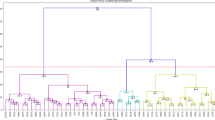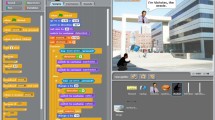Abstract
Scratch is widely used as an introductory educational tool for computer programming. However, little is known about how the action of adding favorite projects on Scratch social media influences programming skill improvement. On Scratch social media, learners select personally intriguing projects to view and learn from. Favorite projects both motivate users to participate on social media and serve as scaffolding material for learners. In this study, we analyzed a dataset of 50,786 users from 5 years of longitudinal activities on Scratch social media using the Zones of Proximal Flow theory. To understand how favorite projects influence learners, we compared the frequency of social media use and programming skill improvement between users who did and did not add favorite projects, and we found a significant difference in programming skill improvement. Among users with favorite projects, there is a proximal difference of two to five Dr. Scratch scores of the favorite project above users’ capability level, which maximizes the frequency of social media use and programming skill improvement.



Similar content being viewed by others
References
Basawapatna, A. R., Repenning, A., Koh, K. H., & Nickerson, H. (2013, August). The zones of proximal flow: guiding students through a space of computational thinking skills and challenges. In Proceedings of the ninth annual international ACM conference on International computing education research (pp. 67–74).
Blincoe, K., Sheoran, J., Goggins, S., Petakovic, E., & Damian, D. (2016). Understanding the popular users: Following, affiliation influence and leadership on GitHub. Information and Software Technology, 70, 30–39. https://doi.org/10.1016/j.infsof.2015.10.002
Brennan, K., & Resnick, M. (2012). New frameworks for studying and assessing the development of computational thinking. In Proceedings of the 2012 annual meeting of the American educational research association, Vancouver (Vol. 1, p. 25).
Chowdhury, B., Johri, A., Kafura, D., & Lohani, V. (2019). Be Constructive: Learning Computational Thinking Using Scratch™ Online Community. In: International Conference on Web-Based Learning). Springer, Cham. (pp. 49–60)
Chugh, R., & Ruhi, U. (2018). Social media in higher education: A literature review of Facebook. Education and Information Technologies, 23(2), 605–616.
Csikszentmihalyi, M., & Csikzentmihaly, M. (1990). Flow: The psychology of optimal experience (Vol. 1990). Harper & Row.
D’Mello, S., & Graesser, A. (2012). Dynamics of affective states during complex learning. Learning and Instruction, 22(2), 145–157.
Dogruer, N., Menevi, I., & Eyyam, R. (2011). What is the motivation for using Facebook? Procedia-Social and Behavioral Sciences, 15, 2642–2646.
Fields, D. A., Giang, M., & Kafai, Y. (2014). Programming in the wild: trends in youth computational participation in the online scratch community. In: Proceedings of the 9th workshop in primary and secondary computing education (pp. 2–11).
Grover, S., Pea, R., & Cooper, S. (2015). Designing for deeper learning in a blended computer science course for middle school students. Computer Science Education, 25(2), 199–237. https://doi.org/10.1080/08993408.2015.1033142
Hill, B. M., & Monroy-Hernández, A. (2017). A longitudinal dataset of five years of public activity in the Scratch online community. Scientific data, 4(1), 1–14.
Hoffman, D. L., & Novak, T. P. (2009). Flow online: Lessons learned and future prospects. Journal of Interactive Marketing, 23(1), 23–34.
Hsu, Y. C., Irie, N. R., & Ching, Y. H. (2019). Computational thinking educational policy initiatives (CTEPI) across the globe. TechTrends, 63(3), 260–270. https://doi.org/10.1007/s11528-019-00384-4
Jiang, B., Zhao, W., Gu, X., & Yin, C. (2021). Understanding the relationship between computational thinking and computational participation: A case study from Scratch online community. Educational Technology Research and Development. https://doi.org/10.1007/s11423-021-10021-8
Kafai, Y. B., Fields, D., & Burke, W. Q. (2012). Entering the clubhouse: Case studies of young programmers joining the online Scratch communities. In End-user computing, development, and software engineering: new challenges IGI Global, (pp. 279–294).
Klahr, D., & Carver, S. M. (1988). Cognitive objectives in a LOGO debugging curriculum: Instruction, learning, and transfer. Cognitive Psychology, 20(3), 362–404.
Lee, I., Martin, F., Denner, J., Coulter, B., Allan, W., Erickson, J., Malyn-Smith, J., & Werner, L. (2011). Computational thinking for youth in practice. Acm Inroads, 2(1), 32–37. https://doi.org/10.1145/1929887.1929902
Maloney, J., Burd, L., Kafai, Y., Rusk, N., Silverman, B., & Resnick, M. (2004). Scratch: a sneak preview [education]. In: Proceedings. Second International Conference on Creating, Connecting and Collaborating through Computing, 2004. IEEE (pp. 104–109).
Manca, S. (2020). Snapping, pinning, liking or texting: Investigating social media in higher education beyond Facebook. The Internet and Higher Education, 44, 100707.
Mao, J. (2014). Social media for learning: A mixed methods study on high school students’ technology affordances and perspectives. Computers in Human Behavior, 33, 213–223. https://doi.org/10.1016/j.chb.2014.01.002
Monroy-Hernández, A., & Resnick, M. (2008). Empowering kids to create and share programmable media. Interactions, 15(2), 50–53. https://doi.org/10.1145/1340961.1340974
Moreno-León, J., Robles, G., & Román-González, M. (2015). Dr. Scratch: Automatic analysis of scratch projects to assess and foster computational thinking. RED. Revista De Educación a Distancia, 46, 1–23.
Moreno-León, J., Robles, G., & Román-González, M. (2016). Examining the relationship between socialization and improved software development skills in the scratch code learning environment. Journal of Universal Computer Science, 22(12), 1533–1557.
Moreno-León, J., Robles, G., & Román-González, M. (2017). Towards data-driven learning paths to develop computational thinking with scratch. IEEE Transactions on Emerging Topics in Computing, 8(1), 193–205.
Niu, L. (2019). using facebook for academic purposes: current literature and directions for future research. Journal of Educational Computing Research, 56(8), 1384–1406. https://doi.org/10.1177/0735633117745161
Papert, S. (1980). (1980) Mindstorms: Children, computers, and powerful ideas. Basic Books.
Papert, S. (1986). Constructionism: A new opportunity for elementary science education. Massachusetts Institute of Technology, Media Laboratory, Epistemology and Learning Group.
Pelet, J. É., Ettis, S., & Cowart, K. (2017). Optimal experience of flow enhanced by telepresence: Evidence from social media use. Information & Management, 54(1), 115–128.
Resnick, M., & Rusk, N. (2020). Coding at a crossroads. Communications of the ACM, 63(11), 120–127.
Roque, R., Rusk, N., & Resnick, M. (2016). Supporting diverse and creative collaboration in the Scratch online community. In U. Cress, J. Moskaliuk, & H. Jeong (Eds.), Mass collaboration and education (pp. 241–256). Springer.
Salac, J., Thomas, C., Butler, C., Sanchez, A., & Franklin, D. (2020, February). TIPP&SEE: A Learning Strategy to Guide Students through Use-Modify Scratch Activities. In: Proceedings of the 51st ACM Technical Symposium on Computer Science Education (pp. 79–85). https://doi.org/10.1145/3328778.3366821
San Pedro, M. O. Z., d Baker, R. S., Gowda, S. M., & Heffernan, N. T. (2013). Towards an understanding of affect and knowledge from student interaction with an intelligent tutoring system. In: International conference on artificial intelligence in education Springer, Berlin (pp. 41–50).
Scratch Community Statistics (2022). "Monthly Activity Trends[Chart]". Retrieved September 27, 2022 from https://scratch.mit.edu/statistics/
Sentance, S., Waite, J., & Kallia, M. (2019). Teachers' Experiences of using PRIMM to Teach Programming in School. In: Proceedings of the 50th ACM Technical Symposium on Computer Science Education (pp. 476–482).
Smagorinsky, P. (2018). Deconflating the ZPD and instructional scaffolding: Retranslating and reconceiving the zone of proximal development as the zone of next development. Learning, Culture and Social Interaction, 16, 70–75.
Statista. (2022, Jan). “U.S. Social Media Penetration 2026”. Retrieved March 27, 2022 from https://www.statista.com/statistics/304737/social-network-penetration-in-usa/
Tang, X., Yin, Y., Lin, Q., Hadad, R., & Zhai, X. (2020). Assessing computational thinking: A systematic review of empirical studies. Computers & Education, 148, 103798. https://doi.org/10.1016/j.compedu.2019.103798
Tang, Y., & Hew, K. F. (2017). Using twitter for education: Beneficial or simply a waste of time? Computers & Education, 106, 97–118. https://doi.org/10.1016/j.compedu.2016.12.004
Vygotsky, L. S., & Cole, M. (1978). Mind in society: Development of higher psychological processes. Harvard University Press.
Wing, J. M. (2006). Computational thinking. Communications of the ACM, 49(3), 33–35. https://doi.org/10.1145/1118178.1118215
Wolz, U., Hallberg, C., & Taylor, B. (2011). Scrape: A tool for visualizing the code of Scratch programs. In: Poster presented at the 42nd ACM Technical Symposium on Computer Science Education, Dallas
Zhang, L., & Nouri, J. (2019). A systematic review of learning computational thinking through Scratch in K-9. Computers & Education, 141, 103607. https://doi.org/10.1016/j.compedu.2019.103607
Acknowledgements
We thank Prof. Xiangdong Chen and Prof. A.Y.M. Atiquil Islam(East China Normal University) for enlightening discussions. We thank Prof. Yonghe Wu (East China Normal University) for sharing the analysis methods on big data. We thank Prof. Andres Monroy-Hernandez (Princeton) for sharing data on Scratch social media and for the warm and detailed reply to our follow-up questions.
Author information
Authors and Affiliations
Contributions
EL: Conceptualization, Data curation, Formal analysis, Investigation, Methodology, Writing—original draft. JL: Data curation, Methodology, Writing—review & editing. JZ: Conceptualization, Supervision—review & editing.
Corresponding author
Ethics declarations
Conflict of interest
The authors have no conflicts of interest to declare that are relevant to the content of this article.
Additional information
Publisher's Note
Springer Nature remains neutral with regard to jurisdictional claims in published maps and institutional affiliations.
Rights and permissions
Springer Nature or its licensor holds exclusive rights to this article under a publishing agreement with the author(s) or other rightsholder(s); author self-archiving of the accepted manuscript version of this article is solely governed by the terms of such publishing agreement and applicable law.
About this article
Cite this article
Lian, E., Lin, J. & Zhang, J. Exploring the influence of favorite projects on programming skill improvement: analyzing the longitudinal dataset of 5 years of public activity on scratch social media. Education Tech Research Dev 71, 295–312 (2023). https://doi.org/10.1007/s11423-022-10157-1
Accepted:
Published:
Issue Date:
DOI: https://doi.org/10.1007/s11423-022-10157-1




